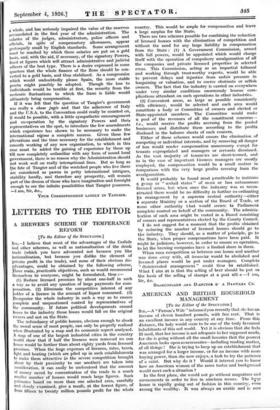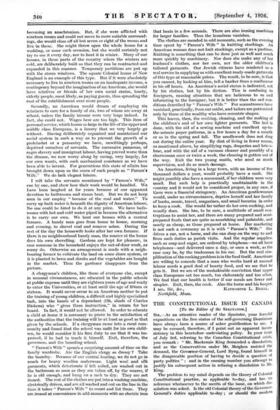AMERICAN ' AND BRITISH HOUSEHOLD MANAGEMENT [To the Editor of
the SPECTATOR.] " Parson's Wife "informed you recently that she has an income of eleven hundred pounds, with free rent. That is an 'excellent income in any country at any time. From this distance, the lady would teem to be one of the truly favoured inhabitants of this sad world. Yet it is obvious that she feels uied, that her income is not adequate to her supposed needs, for she is going without all the small luxuries that the poorest A merican looks upon as necessaries—including reading matter, of all things ! She is trying to keep up an establishment that was arranged for a larger income, or for an income with more buying power, than she now enjoys, a task to try the patience of a saint. But why do it ? Would it interest you to know bow an American woman of the same tastes and background would meet such a situation ?
In the first place, she would not go without magazines and amusements in order to live in nineteen rooms. The loirge house is rapidly going out of fashion in this country, even among the wealthy: It 'Was always an exotic and is now
becoming an anachronism. But, if she were afflicted with nineteen rooms and could not move to more suitable surround- ings, she would close off all but seven or eight of the rooms and live in those. She might throw open the whole house for a wedding, or some such occasion, but she would certainly not try to use it every day, nor to heat it in winter. Many of our houses, in those parts of the country where the winters are cold, are deliberately built so that they can be contracted and expanded in this manner. Temporary partitions are put up with the storm windows. The square Colonial house of New England is an example of this type. But if it were absolutely necessary to live in nineteen rooms on an inadequate income, a contingency beyond the imagination of an American, she would have relatives or friends of her own social status, lonely, elderly people, most likely, as paying guests, thus spreading the cost of the establishment over more people.
Secondly, no American would dream of employing six retainers to care for a family of six, two of whom are away at school, unless the family income were very large indeed. In feet, she could not. Wages here are too high. This item of personal service, which looms so large in the life of the upper and middle class European, is a luxury that we very largely go without. Having deliberately organized and maintained our social system in such a way as to prevent the growth of a proletariat or a peasantry we have, unwittingly perhaps, deprived ourselves of servants. The successive panaceas, of negro slavery and immigrant labour, having proved worse than the disease, we now worry along by caring, very largely, for our own wants, with such mechanical assistance as we have been able to invent. For generations this state of affairs has brought down upon us the scorn of such people as "Parson's Wife." We do lack elegant leisure.
I will take the servants mentioned by "Parson's Wife," one by one, and show how their work would be handled. We Lave been laughed at for years because of our apparent devotion to bathrooms and steam heat. But we do not keep men in our employ "because of the coal and water." To carry up bath water is beneath the dignity of American labour. No one could be hired to do it at any price. We have bath- rooms with hot and cold water piped in because the alternative is to carry our own. We heat our houses with a central furnace. A handy man goes from house to house, morning and evening, to shovel coal and remove ashes. During the rest of the day the housewife looks after her own furnace. If there is no neighbourhood handy man, the master of the house does his own shovelling. Gardens are kept for pleasure, in case someone in the household enjoys the out-of-door work, as many do. Otherwise an arrangement is made with a neigh- bouring farmer to cultivate the land on some share system, or it is planted to lawn and shrubs and the vegetables are bought in the market. Thus the gardener disappears from the picture.
A clergyman's children, like those of everyone else, except in unusual circumstances, are educated in the public schools at public expense until they are eighteen years of age and ready to enter the Universities, or at least until the age of fifteen or sixteen. It would never occur to an American mother to put the training of young children, a difficult and highly specialized task, into the hands of a dependant (Oh, shade of Charles Dickens) who "gives them instruction," in return for her board. In fact, it would not be allowed. In order to educate a child at home it is necessary to prove to the satisfaction of the authorities that the training will be at least as good as that given by the schools. If a clergyman came into a rural com- munity and found that the school was unfit for his own child- ren, he would consider it his first duty to see that it was im- prayed, if he had to teach it himself. Exit, therefore, the governess, and the boarding school.
"Parson's Wife" spends a surprising amount of time on the family wardrobe. Are the English clergy so dressy ? Take the laundry. Because of our central heating, we do not go in much for heavy woollen underwear. Light wool and silk garments, which deteriorate if left soiled, are washed out in the bathroom as soon as they are taken off, by the wearer, if he is old enough, and hung on a rack to dry. They are not ironed. The rest of the clothes are put into a washing machine, electrically driven, and are all washed and out on the line in the time it takes "Parson's Wife" to count and list them. They are ironed at convenience in odd moments with an electric iron that heats in a few seconds. There are also ironing machines for larger families. Thus the laundress vanishes.
The clothes are mended in odd moments, such as the evening time spent by "Parson's Wife" in knitting stockings. An American woman does not knit stockings, except as a pastime. Knitting is something that can be done just as well and much mere quickly by machinery. Nor does she make any of her husband's clothes, nor her own, nor the older children's tailored garments. Our Jewish citizens have rendered us a real service in supplying us with excellent ready-made garments of this type at reasonable prices. The result, to be sure, is that you cannot, by looking at him, tell a banker from a coalheaver in his off hours. An American's social status is indicated, not by his clothes, but by his diction. This is confusing to foreigners, causing situations that are ludicrous to us and infuriating to the foreigner, but it is better than the sad con- ditions described by " Parson's Wife" For seamstresses have vanished, practically, from our midst, and tailors are patronized only by those of the wealthy who have eccentric shapes.
This leaves, then, the cooking, cleaning, and the making of the children's and of her own lighter garments. The last is done, with the aid of a sewing machine and excellent up-to- the-minute paper patterns, in a few hours a day for a month or so in the spring and fall. The needlework does not drag out during the entire year. By dint of living in fewer rooms, as mentioned above, by simplifying rugs, draperies and brie-h- brae, and with the aid of a vacuum cleaner and possibly of a charwoman once or twice a week, the cleaning is gotten out of the way. Exit the two young maids, who need so much supervision, and do so much damage.
An American, living in a large town, with an income of five thousand dollars a year, would probably have a cook. She might possibly also have a nursemaid, if her children were very small. But such help is practically unobtainable in the country and it would not be considered proper, in any case, if there were a financial stringency. An American gentlewoman would, under no circumstances, deprive herself and her family of books, music, travel, magazines, and small luxuries in order to keep a cook. She would far rather do her own cooking, and usually does. She has, to be sure, a multitude of small con- traptions to assist her, and there are many prepared and semi- prepared foods that are quite as nourishing and palatable, and nearly as cheap, as those prepared at home. Her marketing is not such a ceremony as it is with "Parson's Wife." She drives a ear, not a horse, and she can shop on the way to and from such duties as parish visits. And the regular supplies, such as soap and sugar, are ordered by telephone—we all have telephones—and delivered once a day, or once a week, as the case may be, by the tradesman in his car. But the real sim- plification of the cooking problem is in the food itself. Americans are willing to concede that a man who works hard at manual labour needs a good deal of hearty food, and we see that he gets it. But we are of the unshakeable conviction that upper class Europeans eat too much, too elaborately and too often. We find that our health is better if our meals are fewer and simpler. Exit, then, the cook. Also the horse and his keeper.



































 Previous page
Previous page